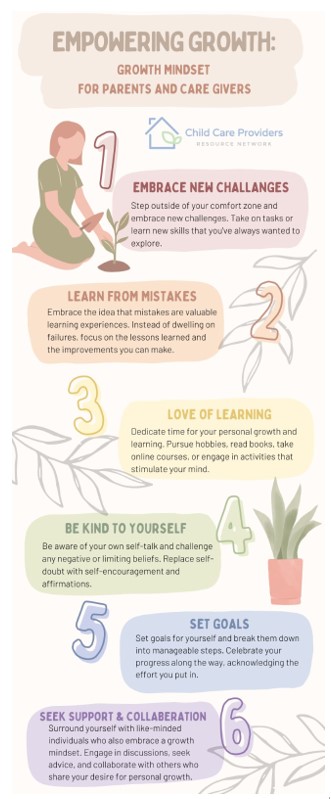Empowering Growth: Growth Mindset for Parents and Caregivers
Written by Krystal Kirkwood, RECE
As parents and caregivers, we have the incredible opportunity to shape the mindset of our children. But it is equally important to develop a growth mindset within ourselves. By embracing a growth mindset, we can model resilience, inspire lifelong learning, and create a positive environment for our children. In this blog post, we will explore the differences between a growth mindset and a fixed mindset and share simple ways for parents and caregivers to foster a growth mindset within themselves.
A Growth Mindset will embrace challenges and personal development. A growth mindset means believing that our abilities and intelligence can be developed through effort and learning. It is about seeing challenges as opportunities for growth, rather than obstacles. With a growth mindset, we understand that our skills and capabilities can improve with dedication and practice.
A fixed mindset is when we believe that our abilities and intelligence are fixed traits that cannot significantly change. People with a fixed mindset tend to stay within their comfort zones, avoid challenges, and fear failure. They may believe that their skills are predetermined and limited.

Developing a Growth Mindset Within Ourselves as Parents and Caregivers:
- Embrace New Challenges: Step outside of your comfort zone and embrace new challenges. Take on tasks or learn new skills that you have always wanted to explore. By doing so, you model the courage to grow and inspire your children to do the same.
- Learn from Mistakes: Embrace the idea that mistakes are valuable learning experiences. Instead of dwelling on failures, focus on the lessons learned and the improvements you can make. Show your children that mistakes are not setbacks, but steppingstones to success.
- Cultivate a Love for Learning: Set aside time for your personal growth and learning. Pursue hobbies, read books, take online courses, or engage in activities that stimulate your mind. Share your newfound knowledge and excitement with your children, inspiring their curiosity and love for learning.
- Practice Positive Self-Talk: Be aware of your own self-talk and challenge any negative or limiting beliefs. Replace self-doubt with self-encouragement and affirmations. Cultivate a mindset that believes in your own capacity to learn and grow.
- Set Realistic Goals: Set goals for yourself and break them down into manageable steps. Celebrate your progress along the way, acknowledging the effort you put in. By demonstrating goal setting and perseverance, you teach your children the value of continuous improvement.
- Seek Support and Collaboration: Surround yourself with like-minded individuals who also embrace a growth mindset. Engage in discussions, seek advice, and collaborate with others who share your desire for personal growth. Create a support system that fosters growth and resilience.

When we practice the skills of growth mindset as parents and caregivers, we can become powerful role models for our children. As you foster a growth mindset within yourself, you will create an environment that encourages your children to embrace challenges, persevere through obstacles, and unlock endless possibilities. Join us on this journey of growth together and inspire children to believe in their ability to learn and achieve great things.
